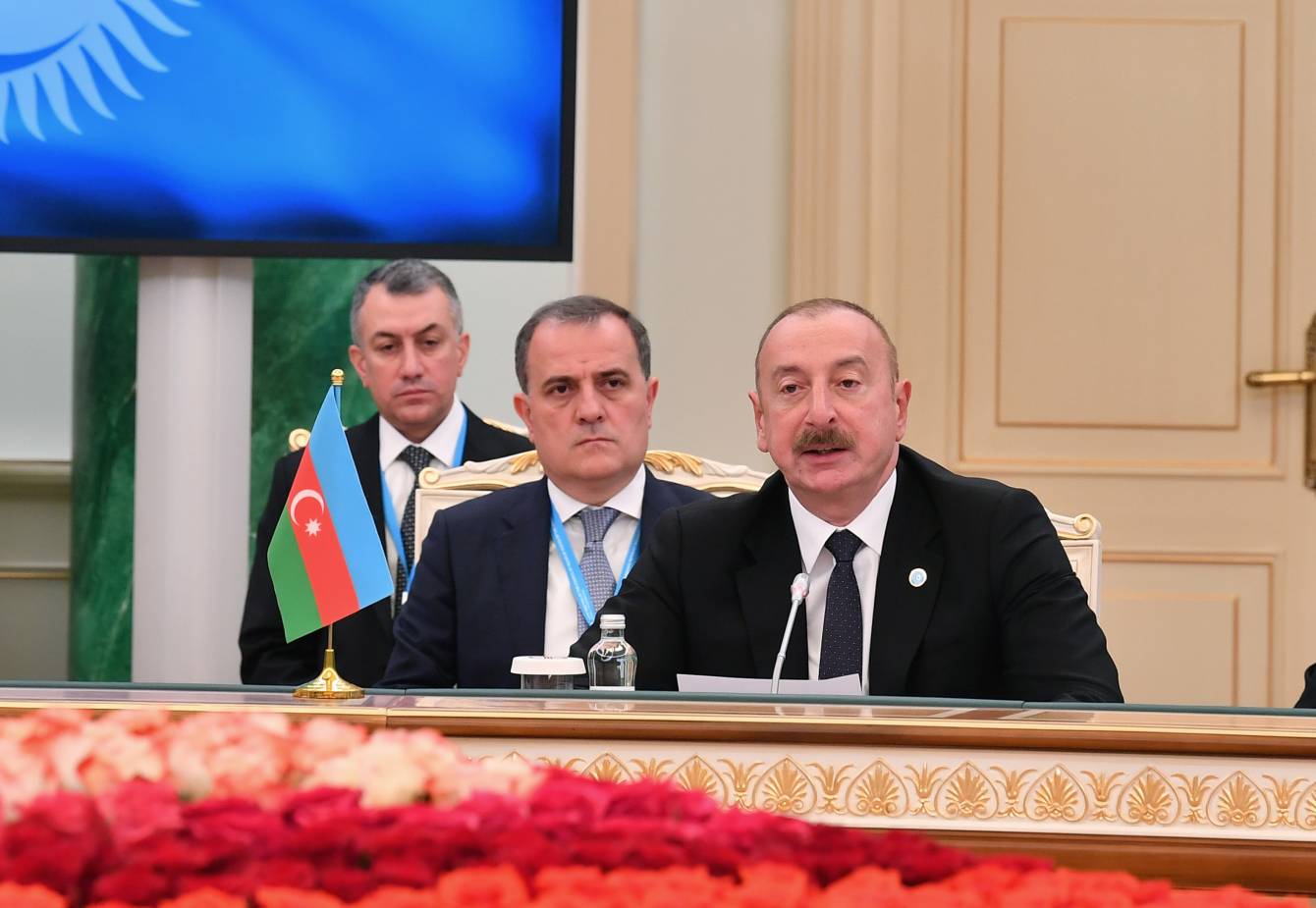President Ilham Aliyev has lauded transportation and logistics as a driving force in developing interstate relations between the member states and observers of the Organization of Turkic States (OTS).
At the Tenth Meeting of the Council of Heads of State of OTS in Astana, Kazakhstan, on Thursday, President Aliyev highlighted the efforts by Azerbaijan to increase the organization’s role in Eurasian transportation.
“Azerbaijan has proved to be a reliable transit country between the markets of the Central Asian countries, Türkiye and Europe,” he said at the summit attended by the presidents of Türkiye, Kazakhstan, Uzbekistan, Kyrgyzstan, as well as Chairman of the People’s Council of Turkmenistan and the Hungarian Prime Minister.
President Aliyev underlined the East-West transport connections as a vital factor in pursuing mutual gains for member states of OTS.
“Azerbaijan is making its valuable contribution to the sustainable operation of the East-West transportation corridor,” he stated, referring to the Trans Caspian International Transport Route, known also as the Middle Corridor.
Turkish President Recep Tayyip Erdogan, for his part, called for a stronger collective focus by the OTS on developing transportation networks.
“With this understanding, we continue our efforts to activate the East-West Middle Corridor through the Caspian Sea. We should strengthen our cooperation in removing obstacles to transportation and trade, expand transportation hubs, and facilitating border crossings and visa procedures," Erdogan said.
The Middle Corridor is seen as a modern take on the ancient Silk Road connecting the markets in China and East Asia with Europe through the territories of the OTS member states. Compared to the 10,000-kilometer Northern Corridor, the Middle Corridor provides a more cost-effective and faster trade on a 7,000-kilometer route.
It emerges also as a more viable alternative to the 20,000-kilometer East-West maritime route. For instance, a vessel loaded in China’s Shanghai, Shenzhen, or Qingdao requires a minimum of 40-45 days to reach a port of discharge located in Europe. However, it takes 13 or 15 days to complete the same delivery via the Middle Corridor.
The Middle Corridor opens immense opportunities for cargo traffic in Asia, enabling goods to reach the Middle East, North Africa, and the Mediterranean region by integrating port connections in Türkiye. The strategic location of the Middle Corridor is expected to create significant economic opportunities, allowing South Caucasian and Central Asian countries to benefit from the $600 billion China-Europe trade annually.
For OTS member states, the Middle Corridor is a vital artery to reap the benefits of interstate and intercontinental transport and trade connections. Transport is one of dozens of cooperation areas defined in the charter of the OTS.
The OTS (formerly Cooperation Council of Turkic Speaking States - Turkic Council) was established by Azerbaijan, Kazakhstan, Kyrgyzstan, and Türkiye in 2009 as an intergovernmental organization to promote comprehensive cooperation among Turkic states. Uzbekistan gained full member status in 2019. From 2018-2022, Hungary, Turkmenistan, and the Turkish Republic of Northern Cyprus were granted the status of observers to the OTS.
The organization, whose members together span 4.2 million square kilometers of territory with a population of nearly 160 million, serves as a platform for collective efforts aimed at strengthening peace and stability, promoting wide-ranging cooperation and disclosing the potential for common development among its member states.
Although the OTS promotes deeper relations and solidarity among a specific group of countries, it aims to leverage each country’s regional influence to expand its impact in a wider geography in the Eurasian continent, particularly Central Asia, Caucasus, the Middle East, and Europe.
Years-long individual and mutual work in multiple sectors, including politics, economy, transport, tourism, education, culture, healthcare, justice, space, and others has reshaped the OTS as a significant regional player.
Currently, the nominal GDP of the Turkic states stands at $1.6 trillion and the trade turnover exceeds $1.2 trillion. Turkic states account for 2.2 percent of the world's population, 2.4 percent of the global trade turnover, and, 1.6 percent of the global GDP. The total volume of the GDP with purchasing power parity (PPP) of the Turkic states is $5 trillion.
“If the Turkic countries were a single state, then it would be the 7th largest state in the world in terms of GDP with purchasing power parity (PPP),” Vugar Bayramov, an economist and Member of the Azerbaijani Parliament, wrote.







 President Ilham Aliyev shed light on the evolving contours of the peace process with Armenia during an international conference in Baku this week. ...
President Ilham Aliyev shed light on the evolving contours of the peace process with Armenia during an international conference in Baku this week. ...
 Azerbaijan and Armenia started the process of demarcation of their border on Tuesday, with the installation of the first border markers based on ge...
Azerbaijan and Armenia started the process of demarcation of their border on Tuesday, with the installation of the first border markers based on ge...
 Iran and Pakistan have signed eight cooperation documents in various fields, and agreed to strengthen ties to fight terrorism in the region.
Iran and Pakistan have signed eight cooperation documents in various fields, and agreed to strengthen ties to fight terrorism in the region.
 As the conflict between Ukraine and Russia escalates, the strategic importance of Kharkiv, Ukraine's second-largest city, has come sharply into focus.
As the conflict between Ukraine and Russia escalates, the strategic importance of Kharkiv, Ukraine's second-largest city, has come sharply into focus.
 Iranian President Ebrahim Raisi expressed Tehran’s readiness to participate in significant development projects in Sri Lanka during the inauguratio...
Iranian President Ebrahim Raisi expressed Tehran’s readiness to participate in significant development projects in Sri Lanka during the inauguratio...



